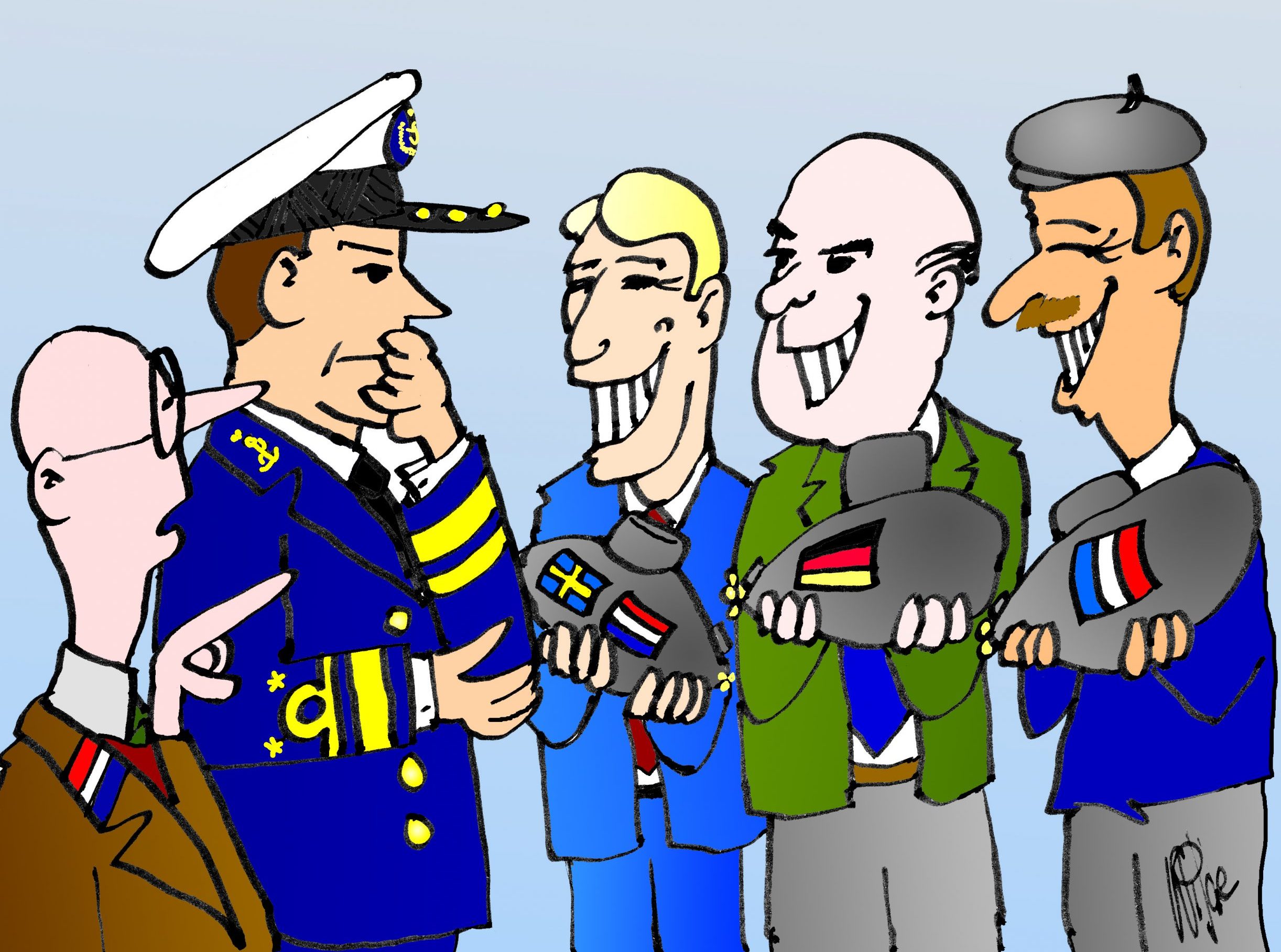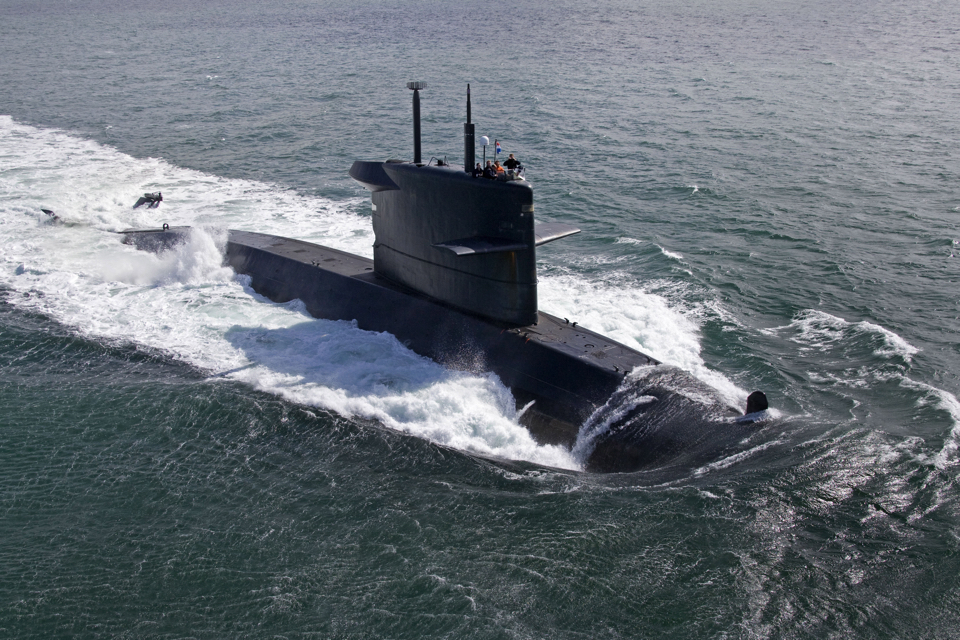Again and again, there have been calls for cooperation and consolidation in the defence industry. It is expected that this would lead to cheaper assets as well as an industry capable of dominating global competition like Airbus versus Boeing. But according to SWZ|Maritime’s editor-in-chief Antoon Oosting, history has proven that cooperation in the European military industry is far from easy and rarely successful.
In every issue of SWZ|Maritime, SWZ|Maritime’s editor-in-chief Antoon Oosting writes an opinion piece under the heading “Markets” about the maritime industry or a particular sector within it. In the June 2021 issue, he discusses the (im)possibilities of the European defence industry working together.
Since WWII, some countries have given up a large part of their naval industry, but some are also starting to build their own frigates and corvettes again. Yet, a lot of politicians keep on complaining about the high costs of building their country’s own warships and think cooperation is the answer to this. In practice, this is a difficult ideal to achieve.
Also read: More money for Dutch defence as calls for European cooperation grow
Still, Dutch politics exerted a lot of pressure to find partners in the process of acquiring a successor to its four submarines that make up the Walrus class. During the search for one or more suitable partners for the joint design and construction of a suitable submarine, the Dutch experienced that, when it comes to their navies, almost all European countries have very different wishes and ideas about what a certain type of ship should be able to do.
Open European tender
Ultimately, the conclusion was that developing and ordering together with one or more other European countries was not a viable option. As a result, an open European tender was chosen in which alle European naval industries could submit their best proposal. So, here we are now with three competitors: a Swedish, a German and a French team, each hoping to entice Dutch politics to choose for their option.

Picture by Hans de Wilde.
This is a far from easy process because as soon as parties are invited for a second round, a customer creates expectations, whether justified or not. The client, the Dutch Government, is of course formulating requirements that a new submarine of the Royal Netherlands Navy must meet. Requirements that are based on the military strategies the Dutch are choosing for operating submarines, laid down in staff requirements of the Ministry of Defence. Choices that can change every time a new cabinet is formed, like the process Dutch politics is in at the moment.
Besides the submarines’ operability, very important considerations in the purchasing process will be the ultimate cost and the participation of the national industry involved in the eventual choice.
Also read: DUKC: Dutch industry can play a major role in submarine replacement
All possible means
This leads to a tendering process in which it is no longer a question of complying with technical requirements, but of using all possible means to influence the political decision-making process.
The French Naval Group’s bid includes the promise of a large amount of work for shipbuilder Royal IHC, particularly in the construction of the hull. A very clever move in terms of public relations, as the ailing Kinderdijk-based shipbuilding group is desperately looking for work to keep its head above water. The Dutch State had to come to its rescue last year with state aid worth EUR 325 million. A sizeable order for the construction of a big part of the Walrus class replacement would probably safeguard IHC for a number of years and provide the Dutch Government with a nice guarantee that it doesn’t have to pay for the credits IHC got from its financiers.
So, at first sight, this French option looks like an offer you can’t refuse and who dares to say no to the French? However, an offer that seems very nice at first glance often turns out not to be so on closer inspection because of future consequences. Officially, the budget for the Walrus replacement amounts to EUR 2.5 billion, but in naval circles, the final cost is expected to be closer to EUR 4 billion.
So, at first sight, this French option looks like an offer you can’t refuse and who dares to say no to the French?
But the financial consequences for the Dutch economy reach much further. Yes, it might save IHC, but it also limits the chances for the Dutch naval shipbuilding industry, especially Damen Shipyards and partners like RH Marine and Alewijnse, to strengthen their position in the global markets. Royal IHC will only be involved as a subcontractor without access to the total technology needed to construct a submarine.
There is no guarantee that besides the Dutch replacement, IHC will also be involved in other big orders the French are seizing. In fact, after winning competitions for the construction of submarines in Australia and India, the ordering process got into trouble again as the Aussies now reconsider their USD 70 billion order for the French submarines.
Plan for Submarine Valley
The German proposal perhaps offers better perspectives. German submarine builder TKMS (ThyssenKrupp Marine Systems) wants to establish a so-called Submarine Valley in naval city Den Helder. At this central location where knowledge exchange takes place with local partners and members of the navy and which already has a shipyard, the new submarines will be finished and maintained. This would create a lot of structural employment: 500 jobs directly, and another 1500 indirectly for suppliers and service providers.
The Royal Netherlands Navy, schools in the Den Helder area and Dutch firms could also play a role in the education and training of the workforce that is needed to maintain submarines. They could also participate in the development of new technologies that will be needed in the future to refit submarines to keep them up to date. TKMS also offers the possibility to cooperate in this with Damen.
This would create a lot of structural employment: 500 jobs directly, and another 1500 indirectly for suppliers and service providers
The question is if this German proposal offers enough perspective for Damen to keep on being a relevant competitor in the global naval shipbuilding industry. Maintenance on ordinary ships offers only minor valued work. Maintenance on submarines is often very complicated and has to meet high quality requirements. The better paid jobs and profits are found in projects that also offer the development of knowledge and technology that can be used again in other projects. That’s why it is so important to keep a self-creating naval industry in the Netherlands.
It is also why Damen often does the steel construction of its ships at the yards in Romania or its 35 other yards in the world, but the finishing touch in the Netherlands.
Chances to survive
Just like its competitors, Damen also needs orders for the development of new ships to stay relevant in the global competition. Besides China and Russia, that have their own political loyal clients and the US, which produces practically only for its own navy, especially South Korea, Japan, France, Italy, the UK, Germany, Spain and Dutch Damen are active on the world markets of building navy ships.
In the export of non-nuclear submarines, it is France and Germany that have the biggest market share. Japan’s offer to the Australians to deliver their Soryu submarine was turned down, in favour of the French Barracuda of Naval Group. Offers from Germany and Sweden had already been rejected by the Australians at an earlier stage.
The Swedes from Saab-Kockums and Damen then found each other in trying to gain the Dutch order together
The Swedes from Saab-Kockums and Damen then found each other in trying to gain the Dutch order together. Both Damen and Saab have a huge interest in this cooperation; Damen to strengthen its position as a competitor in building warships for export and Saab in returning to the export market for the construction of submarines.
After they delivered the Collins class to the Australians in the nineties, Saab have not built any more submarines for export. Besides its interest in delivering the new submarines to replace the Walrus class, Damen especially wants to strengthen its offering of building frigates and corvettes, after the aircraft carriers and submarines the Premier League in naval shipbuilding. Together with German Lürssen, Damen has won the German MKS 180 programme to build four frigates, but the shipbuilder hopes for more. Damen as main contractor, being able to develop, design, engineer and manage this large contract of frigates for the Germans is of course of enormous importance and a proof of excellence.
Strong Italian competition
Besides the German order, Damen could use more new success in global export. Damen has built frigates and corvettes for Mexico, Morocco and Indonesia, but the hope to become the preferred supplier of the latter has faded away. Just recently, the Indonesians chose for an Italian offer to deliver six Fremm class frigates. This frigate is a common French-Italian development from which both countries build their own version.
But it’s the Italians of marine and naval conglomerate Fincantieri who are the most successful in marketing this design for export. Before the Indonesian order, the Italians had already scored with an order from the US Navy for building twenty Fremm frigates on the US yards of Fincantieri. Being able to convince the US Navy of your qualities of course strengthens your image as a naval engineer enormously and must have been of influence in winning over the Indonesians.
At the moment, there are very interesting frigate and corvette orders to be won
So, Damen can use some positive news to back its position in the global competition. Delivering a successful ship to the Germans can help with this, as Damen would also need other export orders to stay relevant in the market against the French-Italian export power. At the moment, there are very interesting frigate and corvette orders to be won, for example from Greece that wants to massively renew its navy, Portugal, Romania and South American navies. This competition is maybe even more exciting, at least for this author, than the European football championship.
Also read: How to fight unfair competition in shipbuilding and dredging
The views, thoughts, and opinions expressed in this article are the authors’s and do not reflect the opinions of the SWZ Foundation or the parties represented therein.








